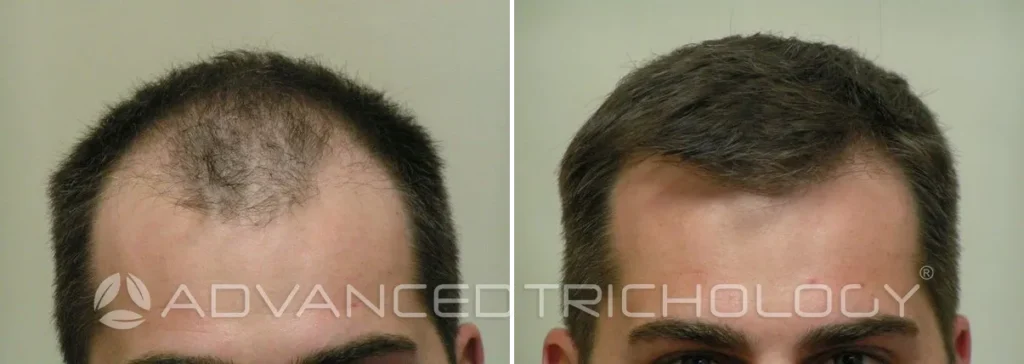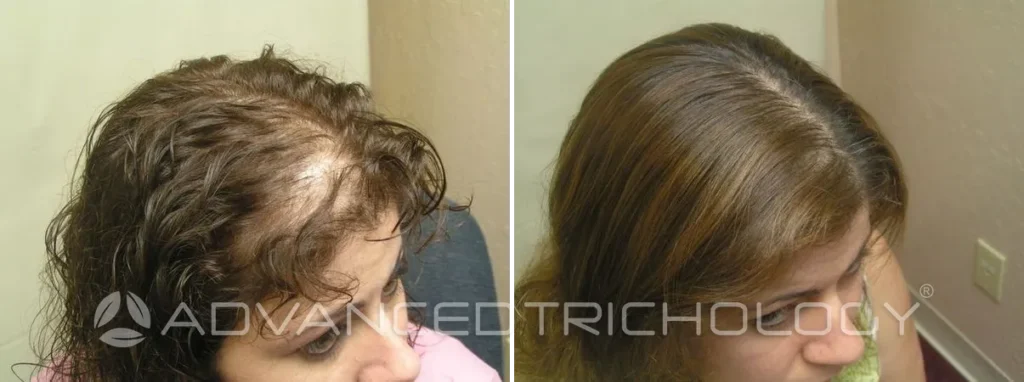Introduction
Hair loss, a widespread issue impacting millions across the globe, emerges as a common concern among individuals. While it’s a natural part of life for many, it can be a distressing experience that impacts self-esteem and confidence. Thankfully, advances in technology have led to the development of various treatments for hair loss, including low-level laser therapy (LLLT) in the form of laser caps. But the question remains: Are laser caps effective for hair loss? Let’s delve into this topic and explore the science and practicality behind these intriguing devices.
Effortless Hair Loss Prevention and Growth!
If you’re committed to preventing hair loss and promoting natural hair growth, look no further than Advanced Trichology. With a proven track record and a wide range of high-quality hair growth products suitable for both men and women, Advanced Trichology is a trusted name in the field. As an affiliate, I’ve had the privilege of witnessing the remarkable results their products can deliver. By using my unique affiliate link, you can access exclusive discounts on Advanced Trichology products through their website. It’s the perfect opportunity to take control of your hair’s health and vitality. Don’t let hair loss hold you back; start your journey towards healthier, fuller hair today!


Understanding Laser Cap Therapy
Laser cap therapy, also known as low-level laser therapy (LLLT) or photobiomodulation therapy, involves the use of low-level lasers or light-emitting diodes (LEDs) to stimulate hair follicles on the scalp. These devices are designed to be worn like a cap or helmet, making the treatment process convenient and non-invasive.
How It Works
The mechanism behind laser cap therapy is not entirely understood, but several theories exist. One prevailing idea is that the low-level laser light stimulates hair growth by accelerating cell division within the hair follicles. Additionally, LLLT may promote the production of new hair strands by activating hair follicle stem cells.
Scientific Support
Numerous studies have explored the effectiveness of LLLT for hair loss. Some of these studies have shown promising results, indicating an increase in hair density and thickness in participants who used laser cap devices. For instance, a study mentioned in an article from “Medicine” found a substantial improvement in hair density among female pattern hair loss patients who used an LLLT comb device three times a week.
Combining Treatments
While laser cap therapy has gained attention for its potential benefits, many experts recommend using it as part of a comprehensive approach to hair restoration. Combining LLLT with other treatments, such as topical minoxidil therapy or platelet-rich plasma (PRP) injections, can enhance results and expedite the regrowth process.
Timing Matters
When it comes to hair restoration, timing plays a crucial role. The earlier you address hair loss, the better your chances are of achieving significant regrowth. It’s important to consult with a healthcare professional to determine the most suitable combination of treatments based on your specific needs and stage of hair loss.
Pros and Cons of Laser Cap Therapy
Like any hair loss treatment, laser cap therapy comes with its own set of advantages and disadvantages.
Pros:
- Safety: Laser cap therapy is considered safe, with no known side effects.
- Non-Invasive: Unlike surgical hair restoration methods, laser caps are non-invasive and painless.
- Convenience: These devices are designed for home use, making them convenient for daily or weekly treatments.
- Promising Results: Scientific studies suggest that laser caps can improve hair density and thickness.
Cons:
- Time-Consuming: Effective results often require regular use, which can be time-consuming.
- Costly: Laser cap devices can be expensive, with prices ranging from hundreds to thousands of dollars.
- Varied Responses: Individual responses to laser cap therapy may vary, and not everyone experiences the same level of success.
Personal Experience and Expert Insights
Many individuals who have tried laser cap therapy report positive outcomes, including increased hair thickness and improved self-confidence. The treatment’s non-invasive nature and lack of side effects make it an attractive option for those seeking hair restoration.
Dr. Hysem Eldik, a dermatologist at Marmur Medical, acknowledges the efficacy of LLLT and its potential to stimulate hair growth. While the exact mechanisms remain a topic of ongoing research, the treatment’s anti-inflammatory properties and ability to reduce damaged cells in the scalp may contribute to its success.
Conclusion: Exploring the Effectiveness
In the quest to combat hair loss, laser cap therapy has emerged as a promising option. While not a standalone solution, it can be a valuable part of a comprehensive hair restoration plan. Its safety, non-invasive nature, and potential for positive results make it an attractive choice for those looking to rejuvenate their locks.
However, it’s essential to manage expectations and recognize that individual responses may vary. Consulting with a healthcare professional who specializes in hair restoration can help determine the most suitable approach for your unique needs. Remember, addressing hair loss early can lead to more successful outcomes, so don’t hesitate to explore the possibilities of laser cap therapy and its role in your journey towards fuller, healthier hair.
Disclaimer: The information provided in this article is for informational purposes only and should not be considered as medical advice. Always consult with a qualified healthcare professional before making any decisions regarding your health or treatments. For more information, please read our Medical Disclaimer.
Frequently Asked Questions:
Yes, laser caps have shown promise in stimulating hair growth, especially in cases of hereditary hair loss.
Absolutely, laser caps are non-invasive, painless, and FDA-approved for home use, making them a safe option.
Yes, combining laser cap therapy with treatments like topical medications or PRP injections can enhance results.
Typically, using a laser cap three times a week for about 20 minutes per session is recommended for optimal outcomes.
Laser caps can range from $600 to $2,500, but they are considered a worthwhile investment if restoring hair is your goal.
References:
- Medicine Article: Low-level light therapy using a helmet-type device for the treatment of androgenetic alopecia
- Honest Hair Restoration Blog: Laser Cap Treatment for Hereditary Hair Loss: Does It Really Work?
- Martha Stewart Article: Do At-Home Laser Hair Growth Caps Really Work? We Asked a Dermatologist




